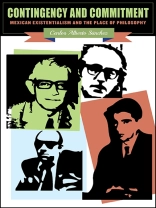Offers the first comprehensive survey of Mexican existentialism to appear in English.
This book examines the emergence of existentialism in Mexico in the 1940s and the quest for a genuine Mexican philosophy that followed it. It focuses on the pivotal moments and key figures of the Hyperion group, including Emilio Uranga, Luis Villoro, Leopoldo Zea, and Jorge Portilla, who explored questions of interpretation, marginality, identity, and the role of philosophy. Carlos Alberto Sánchez was the first to introduce and emphasize the philosophical significance of the Hyperion group to readers of English in The Suspension of Seriousness, and in the present volume he examines its legacy and relevancy for the twenty-first century. Sánchez argues that there are lessons to be learned from Hyperion’s project not only for Latino/a life in the United States but also for the lives of those on the fringes of contemporary, postmodern or postcolonial, economic, political, and cultural power.
Spis treści
Introduction: From Prejudice to Violence
1. EXISTENTIALISM AS PAUSE AND OCCASION: The Appropriations of el Grupo Hiperión
2. DENYING THE POSTMODERN: Jorge Portilla on Reason, Unreason, and the Freedom of Limits
3. THE PASSION DIALECTIC: On Rootedness, Fervors, and Appropriations
4. THE MEXICAN/AMERICAN CHALLENGE TO PHILOSOPHY: Uranga and Dewey
5. PHILOSOPHY SIN MÁS?: Notes on the Value of Mexican Philosophy for Latino/a Life
Notes
Bibliography
Index
O autorze
Carlos Alberto Sánchez is Professor of Philosophy at San José State University and the author of The Suspension of Seriousness: On the Phenomenology of Jorge Portilla, With a Translation of Fenomenología del relajo, also published by SUNY Press.












